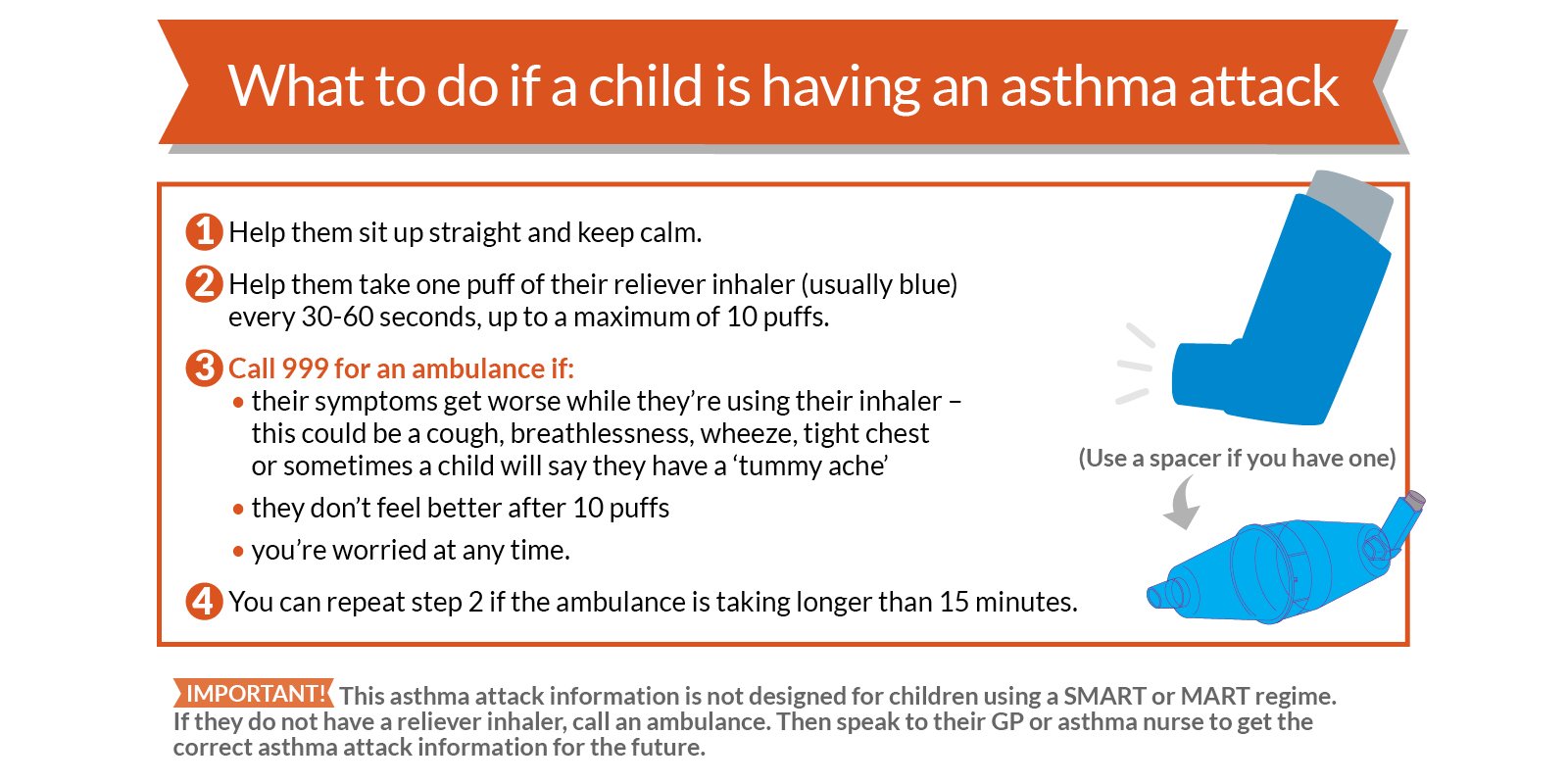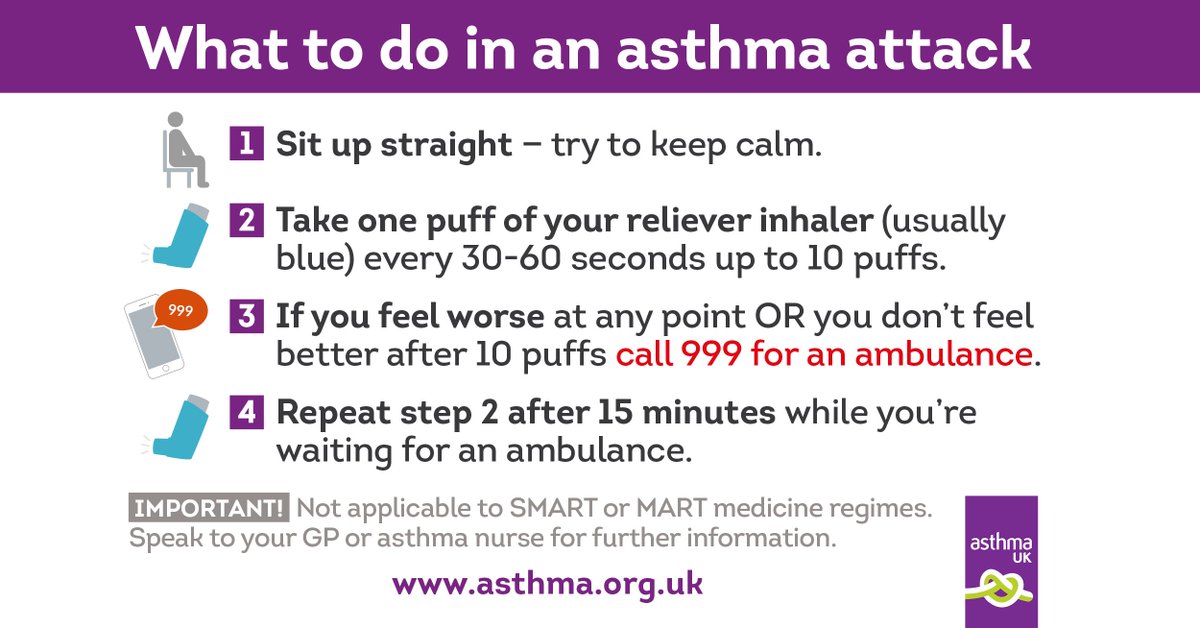How To Recognize Early Asthma Attack Symptoms
Common symptoms of asthma:
- Chest tightness
- Breathing rapidly
An asthma attack occurs when these symptoms intensify. Recognizing these symptoms as they worsen can prevent an attack from becoming life-threatening.
According to the Asthma and Allergy Foundation of America, five things happen during an asthma attack:
- The airway branches become more sensitive and react to things that may trigger an asthma attack.
- The lining of the lungs swells, becoming more and more inflamed.
- Mucus begins to clog the airways.
- Bronchospasm occurs, which is when the muscles surrounding the airways tighten.
- It becomes increasingly more difficult to move air through the airways.
Contact Doctor During Office Hours
- Dont have written asthma action plan from your doctor
- Use an inhaler, but dont have a spacer
- Miss more than 1 day of school per month for asthma
- Asthma limits exercise or sports
- Asthma attacks wake child up from sleep
- Use more than 1 inhaler per month
- No asthma check-up in more than 1 year
- You have other questions or concerns
Emergencies And Your Asthma Action Plan
You and your doctor need to create an asthma action plan that details what to do when you are in different zones green, yellow, or red:
- Green zone: You are free of symptoms and can do your usual activities. Peak flow readings are 80% to 100% of your personal best. Youre doing well. If you use daily control medicine, you should take it as usual.
- Yellow zone: You have symptoms of asthma. Or your peak flow readings are between 50% and 80% of your personal best. Your asthma is worsening. You may need medicine to prevent a more serious asthma attack.
- Red zone: You have symptoms of an asthma emergency. Peak flow readings are 50% or lower of your personal best. You are having a severe attack and need asthma emergency treatment.
Most important, your written asthma action plan spells out what you should do in an asthma emergency.
Since every persons asthma is different, you need to have a custom-tailored asthma emergency treatment plan.
Your plan might include the following steps:
- Use your emergency inhaler as prescribed.
- Take a peak flow reading if you can.
- Get to an emergency room or call 911.
Dont delay. Waiting too long to get asthma emergency treatment can be deadly.
An asthma action plan should also include:
- Your name
- The name and number of your family doctor
- The name and number of your local hospital
- Your personal best peak flow meter reading
Recommended Reading: Asthma Attack Treatment
Whats An Asthma Attack
When you breathe normally, muscles around your airways are relaxed, letting air move easily. During an asthma attack, three things can happen:
- Bronchospasm: The muscles around the airways constrict . When they tighten, it makes the airways narrow. Air cannot flow freely through constricted airways.
- Inflammation: The airway linings become swollen. Swollen airways dont let as much air in or out of the lungs.
- Mucus production: During the attack, your body creates more mucus. This thick mucus clogs airways.
Know When To Get Help

Symptoms that place you in the “red zone” of your asthma action plan are serious. If you experience any of these, follow the instructions in your plan and get emergency care right away:
- Wheezing when you inhale and exhale
- Nonstop coughing
Immediately call 911 or your local emergency number if:
- You can’t talk in full sentences.
- Your lips or fingernails turn blue .
- You begin breathing rapidly .
- You aren’t able to breathe in or out fully.
- You feel confused or agitated.
- Your rescue inhaler doesn’t relieve your symptoms.
Recommended Reading: Cough Variant Asthma Mayo
Symptoms Of An Asthma Attack
Signs that you may be having an asthma attack include:
- your symptoms are getting worse
- your reliever inhaler is not helping
- you’re too breathless to speak, eat or sleep
- your breathing is getting faster and it feels like you cannot catch your breath
- your peak flow score is lower than normal
- children may also complain of a tummy or chest ache
The symptoms will not necessarily occur suddenly. In fact, they often come on slowly over a few hours or days.
How To Reduce The Risk Of An Asthma Attack
- Take the prescribed medicines regularly.
- Visit your doctor regularly for check-ups.
- Make sure you are using the inhaler properly. Monitor your inhaler use.
- Avoid all known triggers whenever possible.
- Avoid first and second-hand smoking!
- Practice relaxation and deep breathing exercises to build lung capacity!
- Reduce unwanted weight for a healthier form.
- Avoid contact with persons who may have respiratory infection even colds;and flu. Take flu vaccinations every year.
And don’t forget to download our comprehensive;ebook on Asthma Management here. If you have registered before, please make sure you are logged in. If you have not registered before, you will need to register.
Recommended Reading: Is There A Cure For Asthma
What To Do After An Asthma Attack:
One in six people who receive treatment at the hospital needs emergency treatment again within two weeks. Asthma attacks are not normal and you should not tolerate them.
Take the following key steps to prevent you having another attack in the future:
- Book an urgent appointment with your healthcare provider
- Keep taking your asthma medication as prescribed
- Take the rest of the day to recover after the attack
It is important to know that the majority of severe asthma episodes can be avoided by having good asthma control.
Acute Asthma Attack Symptoms
An acute asthma attack is a medical emergency youll must seek immediate medical help and go to hospital.
Acute asthma attack symptoms to be aware of include:
- Rapid breathing that doesnt ease with use of a reliever inhaler
- Extreme shortness of breath being unable to inhale or exhale fully
- An inability to speak in full sentences
- Confusion or agitation
- Developing a blue tint on the face, lips or fingernails.
If you dont seek treatment for an acute asthma attack, your life could be in danger. Find out more about acute asthma by reading our guide to severe asthma.
You May Like: How Long Can Someone With Asthma Hold Their Breath
Work With Your Healthcare Team To Control Your Asthma
Asthma is variable your asthma symptoms can get better or worse. If you know how to take care of your asthma every day, you can avoid getting asthma attacks.Your health-care team can teach you how to manage your asthma symptoms. They can help you fill out a written asthma action plan. Your asthma action plan tells you exactly how to treat your symptoms, and what to do when your symptoms get worse.
What Are Common Asthma Attack Triggers
An asthma attack happens when someone comes in contact with substances that irritate them. Healthcare providers call these substances triggers. Knowing what triggers your asthma makes it easier to avoid asthma attacks.
For some people, a trigger can bring on an attack right away. Sometimes, an attack may start hours or days later.
Triggers can be different for each person. But some common triggers include:
- Air pollution: Many things outside can cause an asthma attack. Air pollution includes factory emissions, car exhaust, wildfire smoke and more.
- Dust mites: You cant see these bugs, but they are in many homes. If you have a dust mite allergy, they can cause an asthma attack.
- Exercise: For some people, exercising can cause an attack.
- Mold: Damp places can spawn mold. It can cause problems for people with asthma. You dont even have to be allergic to mold to have an attack.
- Pests: Cockroaches, mice and other household pests can cause asthma attacks.
- Pets: Your pets can cause asthma attacks. If youre allergic to pet dander , breathing in the dander can irritate your airways.
- Tobacco smoke: If you or someone in your home smokes, you have a higher risk of developing asthma. The best solution is to quit smoking.
- Strong chemicals or smells.
With asthma, you may not have all of these symptoms. You may have different signs at different times. And symptoms can change between asthma attacks.
Also Check: Does A Chihuahua Take Away Asthma
Asthma Attack Causes And Symptoms
Asthma affects about 235m people worldwide, including both adults and children. The symptoms of asthma can be well controlled by regular medications and lifestyle choices, but sometimes an Asthma Attack occurs where the symptoms suddenly get worse.
Read on to discover the facts about asthma attacks, what causes them, the symptoms to look out for and common asthma attack triggers.
Why Might Someone With Asthma Be Without An Inhaler

However, this doesn’t mean that everyone with asthma has an inhaler with them at all times. Often when someone has been living without symptoms for a long time, they may assume that their asthma has gone, and so get out of the habit of carrying one. Some people might develop symptoms suddenly for the first time as an adult, with no preparation. Others might just sometimes forget. Unfortunately, not having an inhaler won’t stop an attack.;
Recommended Reading: A Hunter May Have Allergies Asthma
Tips For When You Dont Have An Inhaler
Mild to moderate asthma attacks can occur at inopportune times. You may be able to manage your asthma more effectively with these tips. If these dont work CALL AN AMBULANCE.
Who Can Get Asthma
Anyone can develop asthma at any age. People with allergies or people exposed to tobacco smoke and secondhand smoke are more likely to develop asthma.
Statistics show women tend to have asthma more than men, and asthma affects Black Americans more frequently than other races.
When a child develops asthma, healthcare providers call it childhood asthma. If it develops later in life, its adult-onset asthma.
Children do not outgrow asthma. They may have fewer symptoms as they get older, but they could still have an asthma attack. Your childs healthcare provider can help you understand the risks.
Recommended Reading: Is Asthma High Risk For Covid
How To Help Someone With An Asthma Attack Without An Inhaler
Asthma is a very common condition with around one in 13 of us affected. It’s been increasing since the 1980s and affects people of all ages and backgrounds. There’s currently no cure for asthma, but typically with the right treatment plan and lifestyle changes, most people diagnosed with asthma are able to live normally without severe symptoms.;
However, very occasionally, a person with asthma may be caught off guard. They might find themselves facing an attack without an inhaler to help them. Fortunately, this doesn’t need to be as bad as it might sound. With the right assistance, they could get through an attack using some simple coping techniques.;
If you know someone with asthma, learning more about their condition, as well as what you can do to help them, can be valuable.;
How Do You Stop An Asthma Attack Without An Inhaler
If you are diagnosed with asthma, you should make sure you have an inhaler with you at all times. However, if a worst case scenario occurs and you experience when you dont have a reliever inhaler with you, there are practical steps you can take to ease your symptoms.
- Stay as calm as you can find a way to reduce any anxiety, such as holding someones hand or playing music
- Sit upright this will help keep your airways open
- Breathe slowly and deeply slowing down your breathing can reduce the risk of hyperventilating
- If something appears to have triggered your asthma, such as breathing in cold air or being exposed to smoke, move away from the trigger
- Try breathing exercises the pursed lip breathing technique can help you deal with shortness of breath
- Have a drink containing caffeine there is some evidence to suggest that caffeine can help improve airway function for up to four hours.
Asthma can be a life-threatening condition, so at the very least, aim to keep a spare reliever inhaler in your handbag, locker at work or coat pocket.
Read Also: How To Treat Cough Variant Asthma
Learn First Aid For Someone Who Is Having An Asthma Attack
1. Help the person sit in a comfortable position and take their inhaler.
When someone has an asthma attack, their airways narrow, making it difficult for them to breathe. An inhaler relaxes the muscles, allowing the airways to expand and ease their breathing.
2. Reassure the person. If the attack becomes severe, or they dont have their inhaler, call 999 as soon as possible.
A mild attack should ease within a few minutes. If it doesnt, they can continue to take their inhaler. You should call 999 if they they dont have their inhaler, their inhaler has no effect, they are becoming worse or they become unable to talk. Do not leave them, in case the attack becomes severe quickly. If you cant call 999, get someone else to do it.;;
What Types Of Asthma Are There
Healthcare providers identify asthma as intermittent or persistent . Persistent asthma can be mild, moderate or severe. Healthcare providers base asthma severity on how often you have attacks. They also consider how well you can do things during an attack.
Asthma can be:
- Allergic: Some peoples allergies can cause an asthma attack. Molds, pollens and other allergens can cause an attack.
- Non-allergic: Outside factors can cause asthma to flare up. Exercise, stress, illness and weather may cause a flare.
Read Also: Does Asthma Cause Throat Clearing
Make Them A Hot Drink
A hot drink, like a cup of coffee or tea, can help to open the airways, providing some short-term relief, and giving you time to seek medical assistance.;
If you or someone that you know has experienced symptoms of asthma or has been diagnosed and needs further help, you can learn more by contacting Allergy and Asthma Center, P.C.
The Allergy and Asthma Center, P.C. is committed to offering a friendly and relaxed approach to treating asthma patients of all ages, from all walks of life. Firmly believing that all patients’ needs are unique and that everyone deserves a fully personalized consultation and treatment plan. Get in touch with our friendly and knowledgeable staff today at 920-969-1768, for more information and help.;
What Triggers Asthma Attacks

When you experience an asthma attack, your airways narrow and it gets more difficult to breathe. An asthma attack can come on slowly and gradually, for example, if your usual symptoms arent so well controlled or if youve not been using your preventer inhaler as regularly as you should be. If youve got an upper airway infection then this can also trigger an asthma attack.
Other factors that can trigger asthma attacks include a sudden change in the temperature and cold weather, environmental factors, allergens and even stress or certain foods and drinks.
Recommended Reading: How To Control Your Asthma Naturally
Asthma Signs & Symptoms
People with asthma experience symptoms due to inflammation in the airways. They might only occur when you encounter an asthma trigger. Common symptoms that can lead to a diagnosis of asthma include:
- Persistent or recurring coughing: which often occurs at night or early in the morning, although it can happen at any time. Coughing is a major feature of asthma, especially in children and can sometimes be the only sign of asthma.
- Wheezing: is difficulty breathing accompanied by a whistling sound coming from your airways
- Shortness of breath: gives you the feeling that you cant get enough air into your lungs, and may even find it difficult to eat, sleep or speak
- Chest tightness: an unpleasant sensation of heaviness or pressure in the chest that can make it hard to breathe
- Increased mucus production: is characterized by high levels of thick fluid or phlegm accumulating in your airways
- Difficulty breathing while exercising: having trouble breathing while performing physical activities can be a sign of asthma
- Losing Sleep: Being unable to sleep through the night because of breathing troubles
Where Is My Nearest Specialist Asthma Centre
If youre referred to one of the specialist asthma centres around the UK it will be to the one thats easiest for you to get to. But the number of centres in any one area varies across different regions with some regions having several, and others only one. Usually a specialist asthma centre has a large catchment area.
Ask your GP where your nearest specialist care centre is. You may be able to claim back on travel costs to the centre. Find out more from the NHS.;
Each UK country also has a different approach to specialist care. Wales, for example, doesnt have specialist centres. Instead it has networks of clinicians that may refer people to services in England.
This is one of the reasons that of the 200,000 people living with severe asthma symptoms in the UK, only a very small percentage of people access ongoing care at a specialist asthma centre.
You May Like: How To Strengthen Lungs With Asthma
